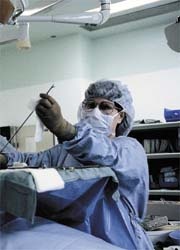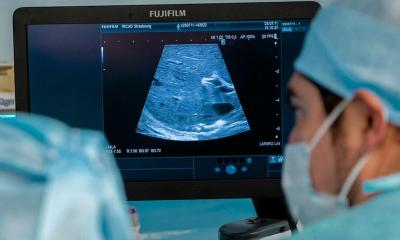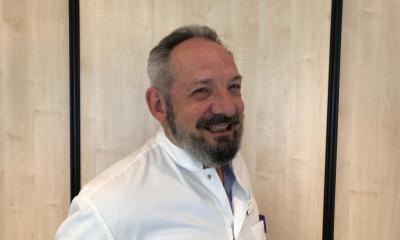Nurse-surgeons
New arrivals on the healthcare platform face a welcome - and controversy
Waiting lists, EU limits on working hours, doctor and nursing staff shortages, how could healthcare providers overcome all those hurdles let alone glimpse the winning post ahead?

- Breast biopsy
- hernia repair
- vasectomies
- testicular torsion
- small bowel anastamoses
- opening/closing for laparotomy
- fracture manipulations
- open fracture debridement
- arthroscopies and ACL reconstructions
- shoulder stabilisations
- reduction and fixation of facial bone fractures
A scheme launched in the UK may provide some answers by shrinking lists, easing working hours, as well as attracting more people to enter the nursing profession.
As part of the UK Government’s revolutionary plans for the country’s National Health Service (NHS), nurses are now being trained to perform a range of surgical procedures.
The length of the training is two years, and those who qualify will be called ‘surgical care practitioners’ (SCP). Up to 5,000 nurses, physiotherapists, and operating theatre assistants are expected to become SCPs within 10 years, and the pay scale proposed for three grades of SCPs is expected to be e50,766 euros per annum.
Behind this job revolution is The NHS Modernisation Agency’s ‘New Ways of Working Programme’. Explaining this concept, an agency spokesperson said that the NHS is trying to give its staff greater job opportunities, and that job upgrades are about ensuring that people who have the potential and skills are being used effectively. Indeed, the NHS has already upgraded the role of certain radiographers, as well as nurses in terms of their being allowed to prescribe certain medicines. In addition, without formal training, an estimated 400 NHS nurses already perform procedures such as vein stripping from the leg for coronary bypass surgery, and some procedures in orthopaedics, ophthalmology and gynaecology. Another significant point made by the NHS Modernisation Agency is that the use of SCPs in two hospitals, reduced the average time for bilateral varicose vein surgery by 30 minutes in one and in the other enabled a two-week target for bladder cancer treatment to be met.
However, as some twenty-five pilot schemes for this training in ‘simple operations’ continued, the further expansion of a nurse’s role met with stronger debate and reactions. Whilst support has come from the National Association of Theatre Nurses, the Royal College of Surgeons and the National Association of Assistants in Surgical Practice, the British Medical Association has warned that the advent of a nurse-surgeon might affect patient safety, and many individual doctors jumped into the controversy, even in one hospital undertaking nurses’ surgical training. Perhaps the strongest argument against educating nurses as SCPs is its potential impact on the education of junior doctors.
As the debate, as well as the keen observation of the results from training are likely to continue, hospitals in the following areas are undertaking SCP training: Birmingham - general surgery; Central Middlesex - minor procedures; Cheltenham - vascular surgery; Liverpool - orthopaedics; Manchester - ophthalmology; Milton Keynes - urology; Morecambe Bay - colorectal; Manchester - gynaecology; Plymouth - hernias.
01.03.2005





